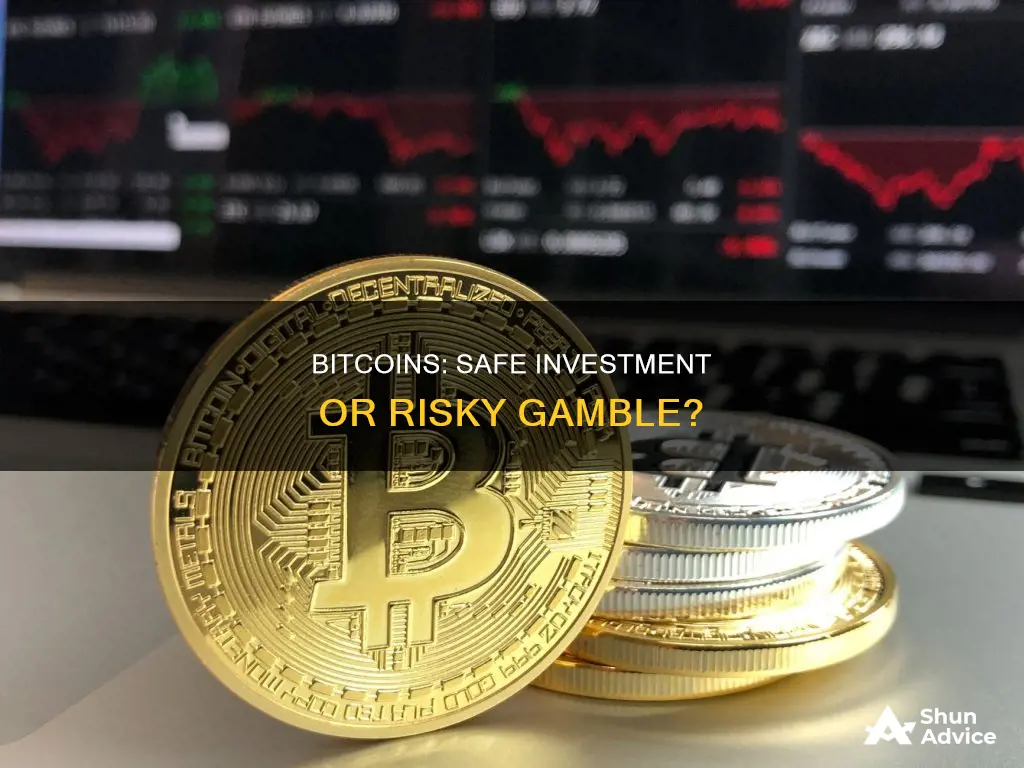
Bitcoin is a risky investment with high volatility and generally should be considered only if you have a high-risk tolerance, are in a strong financial position, and can afford to lose some or all of your investment. The value of Bitcoin can be extremely volatile, and crypto exchanges can fail. Bitcoin is also vulnerable to hackers and pump-and-dump scams. It is not regulated and uninsured, meaning that if you're storing it in an exchange that fails, you could simply lose your entire investment.
| Characteristics | Values |
|---|---|
| Volatility | Bitcoin is extremely volatile. Its value can increase and decrease by double-digit percentages within hours. |
| Regulatory risks | Cryptocurrency is a relatively new and unregulated financial ecosystem. |
| Cybersecurity risks | Bitcoin is stored in digital wallets that are prone to cyber theft. |
| Tax obligations | The IRS considers bitcoin to be a capital asset, so transactions are subject to taxes. |
| Scams | Scams are common in the cryptocurrency world. |
| Lack of inherent value | Bitcoin has no inherent value and is not backed by earnings or profits. |
| Risk of exchange failure | Crypto exchanges can fail, as seen with the collapse of FTX. |
| Loss of access | If you lose your wallet password or someone else gets ahold of it, you lose your Bitcoin. |
What You'll Learn

Bitcoin's volatile nature
Secondly, Bitcoin has a fixed supply cap of 21 million coins, which introduces scarcity. As the supply is limited, demand plays a significant role in price fluctuations. When demand is high, prices surge, and when demand drops, prices can plummet. Large-scale investors or "whales" can also influence supply and demand dynamics with their market actions, leading to sharp price changes.
Media coverage and regulatory news also play a crucial role in Bitcoin's volatility. Positive media attention can increase investor interest and demand, while negative news or rumours of stringent regulations can trigger fear-induced sell-offs. Investor sentiment, shaped by news coverage, commentary, and economic events, can lead to rapid shifts in investor behaviour and further intensify Bitcoin's volatility.
Additionally, the speculative nature of Bitcoin investments adds to the volatility. Investors often try to capitalise on short-term price movements, and the prevalence of social media and real-time news can quickly spread rumours or unverified information, impacting market sentiment.
Lastly, the immaturity of the cryptocurrency market infrastructure can lead to liquidity issues. The capacity to buy or sell large amounts of Bitcoin without significantly affecting the market price is limited compared to more established markets, resulting in significant price changes as investors enter or exit positions.
While these factors may evolve as the market matures and regulatory landscapes change, Bitcoin's price volatility remains a defining characteristic, presenting both opportunities and risks for investors and traders.
Why You Should Avoid a Bitcoin IRA
You may want to see also

Regulatory uncertainty
The regulatory landscape for cryptocurrencies is complex and evolving. In the US, the Securities and Exchange Commission (SEC) has indicated that it considers ICOs to be securities and therefore subject to federal securities law. However, there is still debate around the categorization of crypto assets, with some arguing that they are currencies rather than securities. This uncertainty has led to a lack of clarity and consistency in the regulatory approach across different countries. For example, while Canada allows the use of digital currencies to buy goods and services, it does not consider them legal tender. In contrast, India has banned the use of cryptocurrency by businesses and financial institutions, and China has completely stifled the cryptocurrency industry by not recognizing virtual currencies and banning trading and initial coin offerings (ICOs).
The regulatory uncertainty in the crypto space has implications for investor protection and market integrity. Without clear and consistent regulations, investors may be exposed to financial losses, market manipulation, and fraud. It also creates challenges for companies seeking to raise capital through ICOs, as they must navigate a complex and evolving regulatory environment.
To address these challenges, there is a need for collaboration between government agencies and industry participants to establish a clear and consistent regulatory framework that protects investors while supporting innovation in the crypto industry.
Gladiacoin: Principal Returns and Profits
You may want to see also

Cybersecurity risks
Bitcoin is a unique investment with no inherent value. It was essentially created out of thin air, and it isn't backed by earnings or profits. This makes it highly susceptible to hype, speculation, and promotion, which can cause its price to fluctuate wildly. As such, investors must be prepared for big downturns and accept that Bitcoin may not be a safe investment choice.
Bitcoin's decentralised nature means that there is no body or administrator overseeing the creation, movement, and management of the currency. This lack of central oversight or auditability makes Bitcoin a prime target for cybercriminals.
One of the most significant risks is the potential for hackers to access an individual's private "key", a complex password code that grants access to a digital account. If a hacker steals this key, the Bitcoin associated with that account can be lost permanently.
Additionally, Bitcoin exchanges, where digital money is bought and traded, have been targeted by cybercriminals due to their role as the "middle man" for cryptocurrency trading. These exchanges often have inconsistent or non-existent governmental oversight, making them vulnerable to security breaches.
Phishing campaigns are another common tactic used by scammers to gain access to users' credentials. They create homograph domains and websites that closely resemble legitimate trading platforms, tricking users into disclosing their login information.
Compromised registration forms, third-party applications, and trading installers combined with malware are also methods used by cybercriminals to target Bitcoin users and gain access to their funds or personal information.
To protect themselves, Bitcoin users should prioritise security by using hardware wallets, being cautious with third-party applications, and implementing multifactor authentication.
In summary, while Bitcoin has a highly secure nature due to its use of blockchain technology, the lack of central oversight and the allure of quick financial gains make it a prime target for cybercriminals. As such, individuals considering investing in Bitcoin must be vigilant and proactive in safeguarding their digital assets and personal information.
Should You Invest in Bitcoin Now?
You may want to see also

The lack of inherent value
One of the biggest concerns surrounding Bitcoin as an investment is its lack of inherent value. Unlike traditional investments such as stocks, bonds, or commodities, Bitcoin has no tangible backing or intrinsic value. It is not backed by any physical asset, government, or central bank, and it does not generate cash flow or pay dividends. The value of Bitcoin is solely based on speculation and market demand. This means that the price of Bitcoin is extremely volatile and subject to rapid and significant changes.
Additionally, the finite supply of Bitcoin, which is often touted as a positive feature, can also contribute to its volatile nature. With a limited number of Bitcoins available, small shifts in demand can have outsized effects on its price. This can lead to rapid price increases, potentially forming speculative bubbles, but also equally swift and severe crashes.
It's also worth noting that Bitcoin's lack of inherent value means it may not fulfill the traditional functions of money effectively. While it can be used as a medium of exchange, a store of value, and a unit of account, it falls short in several ways. For instance, its high volatility undermines its reliability as a store of value, and its limited acceptance as a payment method restricts its use as a medium of exchange.
The Ultimate Guide to Investing in Dogecoin via Cash App
You may want to see also

The risks of crypto exchanges
Crypto exchanges are online platforms that allow users to buy, sell, and trade cryptocurrencies like Bitcoin and Ethereum. They are digital marketplaces where users can exchange one cryptocurrency for another or for fiat currency. While crypto exchanges can be a simple and affordable way to invest in cryptocurrency, there are several risks associated with them.
Firstly, crypto exchanges, particularly decentralized exchanges (DEXs), offer a wide range of crypto tokens, including emerging tokens and niche assets. This variety can be appealing to traders, but it also comes with risks. The lack of central authority in DEXs means that transactions occur directly between users through smart contracts on blockchain networks. This direct peer-to-peer model can make it easier for criminals to launder money and engage in other financial crimes. The decentralized nature of DEXs also makes it challenging to detect and prevent such illicit activities.
Secondly, crypto exchanges often lack basic consumer protections offered by traditional financial institutions. For example, crypto exchanges do not have insurance protection from the Securities Investor Protection Corp. or the Federal Deposit Insurance Corp. This means that if an exchange fails or goes out of business, users may lose their entire investment. In contrast, bank accounts in the US are typically insured for up to $250,000 per depositor.
Thirdly, crypto exchanges are vulnerable to cyberattacks and hacking attempts. As exchanges handle large volumes of valuable cryptocurrencies, they are attractive targets for hackers. While exchanges have implemented security measures such as encryption and two-factor authentication, these protections can still be breached. Additionally, users' personal information and transaction data may be at risk, as exchanges collect and store sensitive data.
Another risk to consider is the regulatory landscape surrounding crypto exchanges. The lack of a global regulatory framework for cryptocurrency means that rules and protections can vary significantly across jurisdictions. Some countries, like China, have even made cryptocurrency illegal. The uncertainty and lack of standardized regulations make it challenging to assess the safety and legitimacy of crypto exchanges.
Finally, crypto exchanges are subject to high market volatility and price fluctuations. The value of cryptocurrencies can be extremely volatile, and exchanges may not have adequate risk management measures in place. As a result, users may experience significant losses or gains in a short period. Additionally, the lack of circuit breakers on crypto exchanges, unlike traditional financial exchanges, means that trading continues even during rapid price plunges.
Why You Don't Need Bitcoin to Invest in Ripple
You may want to see also
Frequently asked questions
Not very safe. Bitcoin is a risky investment with more volatility than traditional investments like stocks, bonds and funds. The value of Bitcoin can be extremely volatile and there is a history of dramatic dips. You can also lose your Bitcoin through exchange crashes, losing wallet access or falling victim to scams.
The top risks of investing in Bitcoin are its volatility, the fact that it has no inherent value and the ever-present concern of cybersecurity.
If you want to avoid losing your assets on a crypto exchange, transfer them to a separate crypto wallet. Specifically, consider a cold wallet, which is an offline storage device, much like a USB stick. Cold wallet storage can help eliminate the risk of online theft.







